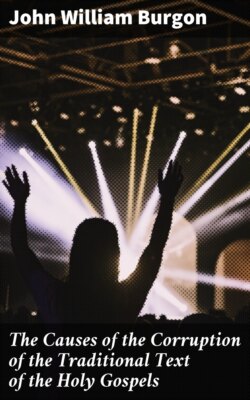Читать книгу The Causes of the Corruption of the Traditional Text of the Holy Gospels - John William Burgon - Страница 17
На сайте Литреса книга снята с продажи.
§ 1.
ОглавлениеTable of Contents
We are sometimes able to trace the origin and progress of accidental depravations of the text: and the study is as instructive as it is interesting. Let me invite attention to what is found in St. John x. 29; where—instead of, 'My Father, who hath given them [viz. My sheep] to Me, is greater than all,'—Tischendorf, Tregelles, Alford, are for reading, 'That thing which My (or the) Father hath given to Me is greater (i.e. is a greater thing) than all.' A vastly different proposition, truly; and, whatever it may mean, wholly inadmissible here, as the context proves. It has been the result of sheer accident moreover—as I proceed to explain.
St. John certainly wrote the familiar words—'ο πατηρ μου ος δεδωκε μοι, μειζων παντων εστι. But, with the licentiousness [or inaccuracy] which prevailed in the earliest age, some remote copyist is found to have substituted for 'οσ δεδωκε, its grammatical equivalent 'ο δεδωκως. And this proved fatal; for it was only necessary that another scribe should substitute μειζον for μειζων (after the example of such places as St. Matt. xii. 6, 41, 42, &c.), and thus the door had been opened to at least four distinct deflections from the evangelical verity—which straightway found their way into manuscripts:—(1) ο δεδωκως … μειζων—of which reading at this day D is the sole representative: (2) ος δεδωκε … μειζον—which survives only in AX: (3) ο δεδωκε … μειζων—which is only found in [Symbol: Aleph]L: (4) ο δεδωκε … μειζον—which is the peculiar property of B. The 1st and 2nd of these sufficiently represent the Evangelist's meaning, though neither of them is what he actually wrote; but the 3rd is untranslatable: while the 4th is nothing else but a desperate attempt to force a meaning into the 3rd, by writing μειζον for μειζων; treating ο not as the article but as the neuter of the relative ος.
This last exhibition of the text, which in fact scarcely yields an intelligible meaning and rests upon the minimum of manuscript evidence, would long since have been forgotten, but that, calamitously for the Western Church, its Version of the New Testament Scriptures was executed from MSS. of the same vicious type as Cod. B[18]. Accordingly, all the Latin copies, and therefore all the Latin Fathers[19], translate—'Pater [meus] quod dedit mihi, majus omnibus est[20].' The Westerns resolutely extracted a meaning from whatever they presumed to be genuine Scripture: and one can but admire the piety which insists on finding sound Divinity in what proves after all to be nothing else but a sorry blunder. What, asks Augustine, was 'the thing, greater than all,' which the Father gave to the Son? To be the Word of the Father (he answers), His only-begotten Son and the brightness of His glory[21]. The Greeks knew better. Basil[22], Chrysostom[23], Cyril on nine occasions[24], Theodoret[25]—as many as quote the place—invariably exhibit the textus receptus ως … μειζων, which is obviously the true reading and may on no account suffer molestation.
'But,'—I shall perhaps be asked—'although Patristic and manuscript evidence are wanting for the reading ο δεδωκε μοι … μειζων—is it not a significant circumstance that three translations of such high antiquity as the Latin, the Bohairic, and the Gothic, should concur in supporting it? and does it not inspire extraordinary confidence in B to find that B alone of MSS. agrees with them?' To which I answer—It makes me, on the contrary, more and more distrustful of the Latin, the Bohairic and the Gothic versions to find them exclusively siding with Cod. B on such an occasion as the present. It is obviously not more 'significant' that the Latin, the Bohairic, and the Gothic, should here conspire with—than that the Syriac, the Sahidic, and the Ethiopic, should here combine against B. On the other hand, how utterly insignificant is the testimony of B when opposed to all the uncials, all the cursives, and all the Greek fathers who quote the place. So far from inspiring me with confidence in B, the present indication of the fatal sympathy of that Codex with the corrupt copies from which confessedly many of the Old Latin were executed, confirms me in my habitual distrust of it. About the true reading of St. John x. 29, there really exists no manner of doubt. As for the 'old uncials' they are (as usual) hopelessly at variance on the subject. In an easy sentence of only 9 words—which however Tischendorf exhibits in conformity with no known Codex, while Tregelles and Alford blindly follow Cod. B—they have contrived to invent five 'various readings,' as may be seen at foot[26]. Shall we wonder more at the badness of the Codexes to which we are just now invited to pin our faith; or at the infatuation of our guides?
